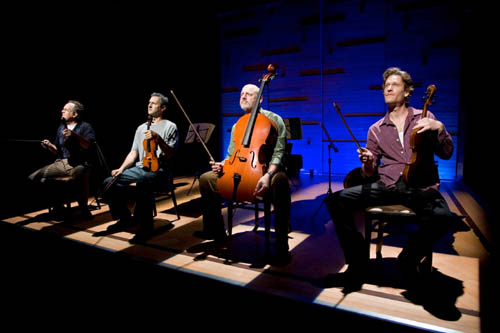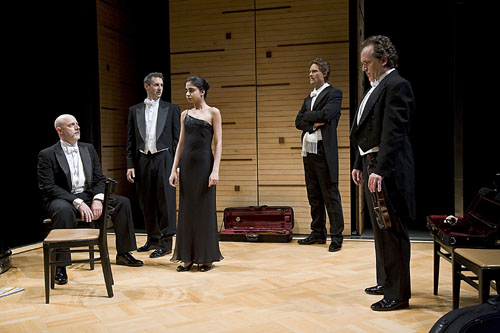
Opus
October 4, 2010
I saw Opus a while ago, a play by Michael Hollinger that deals with the inner workings of a string quartet. Since I have been a violinist in the Guarneri String Quartet for many decades, you can imagine that I awaited the opening curtain with some anticipation. The subject of my profession is not exactly an every-day theatre-going experience. As the house lights began to dim, I also felt a certain amount of trepidation. Fictional stories about musicians, whether in film or the theatre, often fall flat. For starters, actors rarely look convincing as string players. I can’t blame them. The motions necessary to actually play the violin, viola, or cello are surprisingly awkward and complex. Hollinger solved this problem creatively. As music crucial to the plot played in the background, the actors either sat motionless on stage with instruments in playing position or moved in a stylized fashion to denote rather than mimic actual performance.

David Beach, Richard Topol, Douglas Rees and Michael Laurence in Opus by Michael Hollinger
Opus revolves around one specific work in the string quartet literature, Ludwig van Beethoven’s String Quartet in C Sharp Minor, Opus 131. Hollinger’s skillful use of dialogue, a kind of chamber music in itself, showed his understanding of music (the playwright trained to be a professional violist) and his reverence for Beethoven’s masterpiece. The Quartet’s haunting beauty, its innovative construction, and the daunting difficulties were showcased both by Hollinger’s words and Beethoven’s music (expertly played, pre-recorded, by the Vertigo String Quartet, four young musicians recently graduated from the Curtis Institute of Music). At play’s end, I could imagine members of the audience, even ones uninitiated in the great art of the string quartet, wanting to take the Opus 131 experience home with them by purchasing one of the many recordings available on CD.
A play does not rise or fall, however, with the straight-forward celebration of a great work of art, or a plot that only demonstrates a musician’s struggle to solve the mysteries of, say, Opus 131’s opening fugue. Hollinger also chose to draw us into the string quartet’s hothouse atmosphere by creating a tangled web of relationships amongst the musicians. Terrence J. Nolen’s expert direction and superb acting by David Beach, Mahira Kakkar, Michael Laurence, Douglas Rees, and Richard Topol made for a fascinating and highly charged atmosphere. When Opus came to an end, it received an enthusiastic and well-deserved reception from the audience.
The play was unquestionably gripping, yet the evening left me feeling slightly uncomfortable. For ninety minutes, I had witnessed the first violinist’s love affair with the violist, the violist’s eventual firing and subsequent disappearance, the beginning of yet another relationship with the newly arrived violist, and an act (that will go un-named) of shocking violence. I shook my head. In the forty-five years that our quartet has been together, we have had no affairs, no firings, no disappearances, and no such violence. It was tempting to consider Opus just another overwrought drama about musicians and their out-of-control lives. But the more I thought about it, the more I realized that Hollinger had touched upon something significant. String quartets, in real life, have provided the setting for numerous dramas rivaling anything Michael Hollinger could have dreamed up. Opus 131 and all the other wondrous string quartets in the repertoire (the distilled nectar of our entire civilization, I dare wager), loom before quartet players as alluring but treacherous entities that stir our deepest emotions. Haydn’s disturbingly beautiful The Seven Last Words, Mozart’s other-worldly fantasy in the Dissonant, Beethoven’s tempestuous daring in the Great Fugue, and Schubert’s desperate melancholy in Death and the Maiden all demand intense work, great artistry, and deft social skills. When four string players sit down to grapple with these monumental string quartets, things don’t necessarily go smoothly. While the Guarneris have had little more than very heated discussions at times, other quartets have experienced incompatibility, dismissal, affairs, divorce, litigation, nervous breakdowns, and even suicide.
It might be a good idea to ask a newly formed string quartet two sets of questions, one submitted by an optimist, the other by a pessimist, before a single note is played. The optimist’s questions: Will you be happy working in the heady atmosphere of a true democracy without leaders or followers? Are you the proud possessor of an unshakable ego and an open mind when challenged with new ideas possibly foreign to you? Will you be happy working and socializing with three choice, hand-picked musicians? Are you excited by the prospect of traveling the world? And finally, are you content to spend your life with the world’s most sublime music? Now for the pessimist’s questions: Despite being an accomplished instrumentalist and musician, are you willing to suffer the frustration inherent in the monumental technical and musical demands of an Opus 131? Are you able to submit to unrelenting and sometimes withering criticism? Will you settle for earning a meager living for years, then a modest one (if you’re lucky)? Can you cope with traveling relentlessly and often less than glamorously? And are you willing to rehearse, perform, travel, and socialize with the same three people almost daily? Perhaps, a panel including musicians, spiritual advisers, doctors, psychiatrists, psychics, labor mediators, and group facilitators should be on hand to assess the answers and advise prospective string quartet players of their chances for success.

Douglas Rees, Richard Topol, Mahira Kakkar, Michael Laurence and David Beach in Opus by Michael Hollinger
Mahira Kakkar, who played the part of the quartet’s replacement violist, is not a musician. In preparation for the part, she had the good sense to rent a viola, take a few lessons, and show up at the audition with instrument and bow. Mahira kindly invited me to the Opus performance in New York City. When the play was over, I had the pleasure of meeting Michael Hollinger and the entire cast. We stood in the now empty theater and talked about the play and about string quartets. I was taken aback but delighted to learn that Hollinger had heard the Guarneri Quartet often, that he had read my book, Indivisible by Four, a String Quartet in Pursuit of Harmony, and that he had given it to the cast as a source for background information. By now, the actors knew the subject of the string quartet well enough for the lines of distinction between me, the real musician, and them, the pretend-ones, to blur. We were simply a collection of people discussing the miracle of Opus 131’s existence. Someone asked for a group photo and we all gathered together on the stage. Only after the photo had been taken did I notice that I still clutched in my fingers something I had picked up from the stage floor a moment earlier. It was a small bit of material left over from the play’s act of violence mentioned earlier—one that, regrettably, will have to remain un-named out of consideration for those of you who sometime, somewhere, may want to attend Opus. Theatergoers should consider two things, however, before buying tickets to Michael Hollinger’s absorbing play:
- Playing string quartets may be dangerous to your health.
- Playing string quartets may cause protracted states of bliss.
Subscribe
Sign up to receive new stories straight to your inbox!





































































































































































Comments
Powerful statement, Arnold. Worth rereading. Thanks for sharing.
Oh Arnold, how many people can leave me with laughter and tears at the same time ?You are a marvel !
Wall to wall in laughter and tears throughout reading your first three articles, ending with your euology to David Soyer, which totally knocked me off. I am so moved. And than the Chaccone …
I didn’t realize how much I have missed your playing.
You write exquisitely well. I like your keen sense of the absurd, and the laughter in you which is infectious. How much love and life in a curl of a sentence. You draw on hidden strings – masterfully – tearing at the heart, and teasing the mind.
Thanks for talking to us. I am looking for something to criticize, because you will not believe me, but I find none. Please keep writing.
And playing. Hava
I wish so much that I could have been there to see Mahira, and to see the play!
Leave a Comment
*/